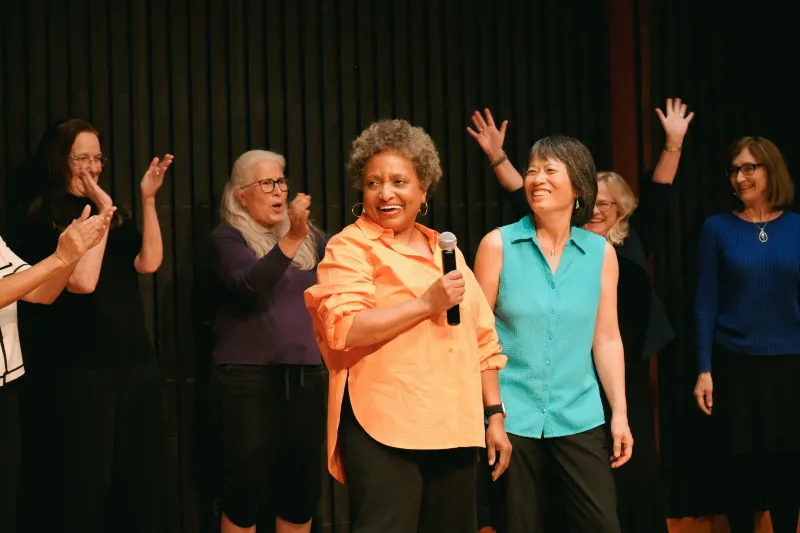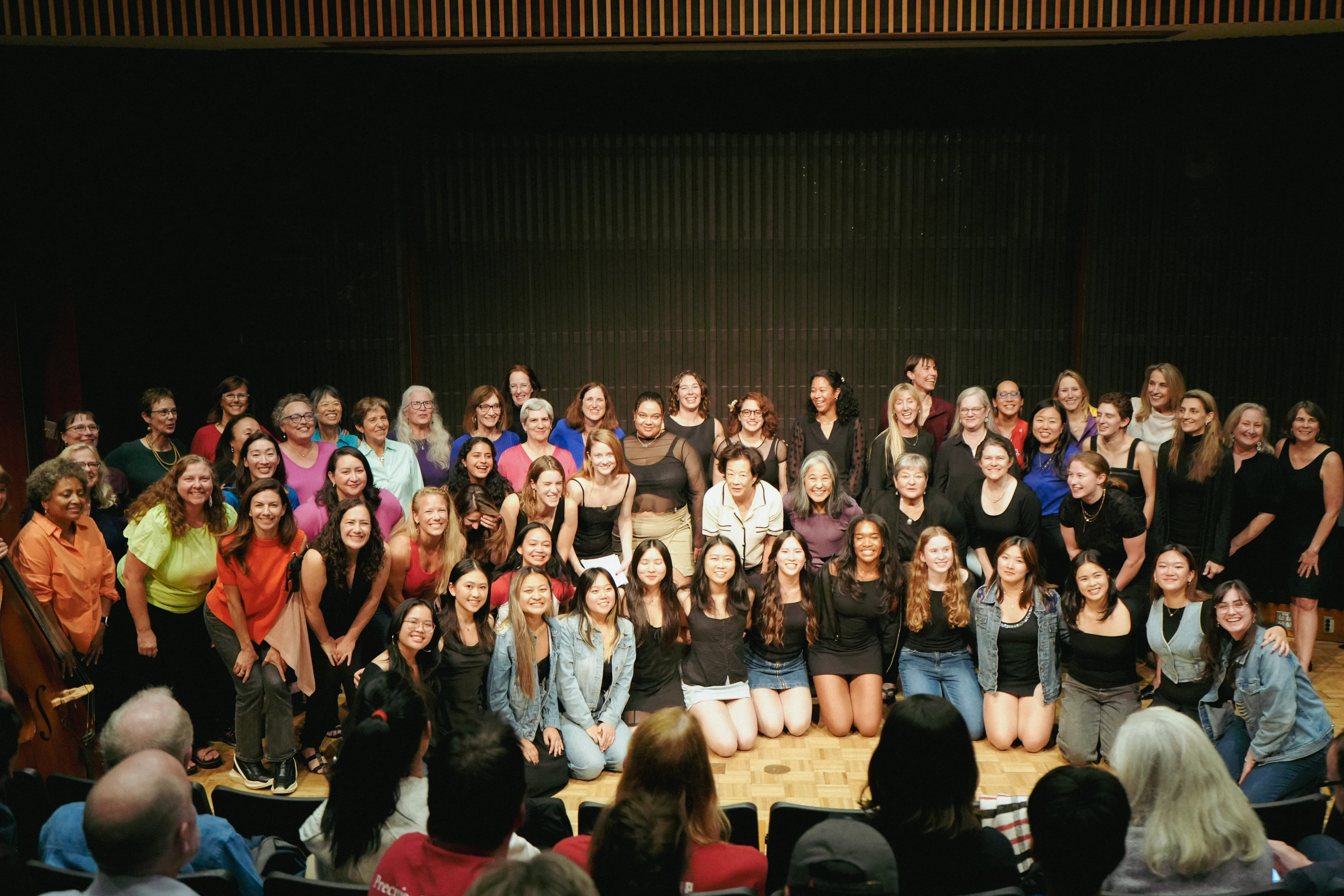When Joyce Van Dee ’81 M.A. ’81 and Linda Chin ’81 M.B.A. ’87 arrived on campus in 1977, there were no women’s a cappella groups.
“I knew that there were talented women on campus that would be interested in joining an a cappella singing group,” Van Dee said. So, she asked Chin if she would be interested in starting their own group after the two met in the Stanford Chorale and bonded over their love for singing.
In 1979, they founded Counterpoint, Stanford’s only soprano/alto singing group and second-oldest a cappella group — the oldest being the Mendicants, then an all-male ensemble.
Fast forward to Oct. 26, 2024, Counterpoint celebrated its 45-year anniversary with a performance at Campbell Recital Hall. The group’s former members were in attendance as they returned to campus for Reunion Homecoming, joining vocal forces with members throughout the years — all known as “Counterpointers.”
Throughout its history, Counterpoint has tried to represent a space for expression, empowerment, but, above all, community, members said.
After joining forces with Chin and receiving support from the Mendicants in organizational and audition logistics, Van Dee spread the word across campus.
“We put up posters. We had auditions in the basement of Dinkelspiel. We selected 12 women and Counterpoint was born,” Van Dee said. Decided by a vote, the group’s name, “Counterpoint,” reflected the interlocking melodies stylistic of Baroque music.
The year it was founded, Counterpoint received the Stanford Alumni Association’s $750 Robert Pierce Memorial Award for “most innovative student project” of the year. The following year, the group applied for and received a grant through the Associated Students of Stanford University (ASSU) to fund their purchases of music and an upright bass.
“There is something amazing about a group of students just organizing themselves [and] deciding they like singing together and care about doing it enough to voluntarily show up for [rehearsals] two times a week … to break out into parts as needed, to go over harder pieces of the music, listen to each other and just laugh and laugh,” said former Counterpointer Nancy Kass ’83.
Current co-president Elizabeth Hong ’27 was surprised by the arts culture when she started at Stanford because of the school’s academics-centered stereotype.
“I had assumed that people wouldn’t necessarily invest as much time outside in creative hobbies,” Hong said. “But I feel like for a cappella, people really do it for the enjoyment of it.”
Back in the day, early Counterpointers like Laurel DePalatis ’83 M.S. ’83 M.A. ’84 performed at many dorm study breaks and at alumni luncheons — “dressed to the nines in ‘30s and ‘40s outfits,” DePalatis said.
Off-campus, the group toured around Northern California. On one trip to the San Francisco Zoo, DePalatis recalled lions beginning to roar when the group started singing. Another time, the group performed during an earthquake in Walnut Creek as they watched “the water slosh out of the backyard pool while cowering in the living room,” DePalatis said.
Counterpoint is an empowering space beyond offering a community to perform with. Former Counterpointer Linda Uyechi ’79 M.S. ’81 M.A. ’90 Ph.D. ’95, a current lecturer in the department of music, said being a part of the group was the first time she sang with only women.
“I was so caught off guard,” Uyechi said. “It was the most amazing sound to be surrounded by only women’s voices — indescribably exciting.”
Meanwhile, Kass developed a strong feminist identity during her time with Counterpoint.
“We could do what we wanted, on our own, take care of our needs and both be really accomplished and love being with each other as we did it,” Kass said.

To Uyechi, the 2024 reunion weekend was a time to “rediscover that first feeling of music-based empowerment.” Early Counterpointers, like Uyechi, have carried their love for singing beyond Stanford, to be rekindled during reunions.
“At the last reunion, we went out for dinner and then broke spontaneously into song outside the restaurant,” Chin said. “Science has shown that singing in a choir provides an endorphin high — and how much higher when you do it with women you’ve known for decades! There is an incredible sense of connection and power when you make music together with others.”
This empowerment has continued through Counterpoint’s history to members today, who similarly view the group as a space of creative expression.
Co-president Gabriella Ugwonali ’27 enjoys a cappella for its freedom to experiment. The group is currently trying out R&B and country arrangements among others like mashups, which afford the singers “flexibility to really change it,” she said.
“It’s been exciting to listen to a song, then think, ‘What parts of the song do I want to bring out? What do I want to keep?’” Ugwonali said.
A particular Fleetwood Mac mashup, “Leah Rhiannon,” stood out to Ugwonali as her favorite. The piece was arranged by a recent Counterpoint alum and dedicated to the arranger’s girlfriend. Ugwonali found it “beautiful … to just hear all the parts coming in.”
Different genres have emerged in Counterpoint’s repertoire, including jazz arrangements from the group’s early years. Chin particularly liked “Lullaby of Birdland” for its challenge and other older songs like “Boogie Woogie Bugle Boy” that she sings for her grandchildren.
“Java Jive” was another one of Chin’s favorites, and it continues to be Counterpoint’s signature song, with different arrangements that reflect the group’s ever-changing dynamic over the years.
Counterpoint currently performs in quarterly shows, Admit Weekend and New Student Orientation, in addition to domestic and international tours. In recent years, the group has taken an annual trip during Martin Luther King Jr. weekend with the Mendicants, performing for alumni organizations in the Southern California area.
With the group’s 45th anniversary, current Counterpointers had the chance to meet former singers. Connecting with Counterpointers from the ‘80s and ‘90s, Ugwonali had the opportunity to learn about their repertoire and listen to their recordings on Spotify.
“It’s really cool to just see how different this group has been over the years and how we fit into the whole timeline,” she said.
Going through the group’s archives and seeing photos with former members in wacky T-shirts for random dress-up days made the co-presidents reflect on the ways Counterpoint has changed. They said they aspire to revive traditions that were lost during COVID-19.
Even as traditions have evolved, Hong believes the group’s mission has stayed the same since its founding.
“I don’t think the core principles have changed,” Hong said. “The goal that we all have is just really to make it open.”
